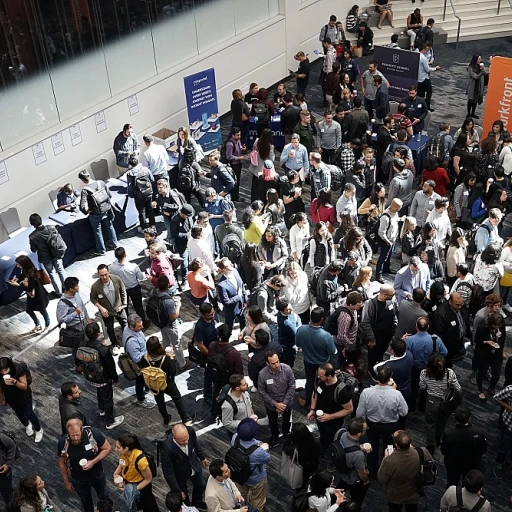
The Purpose of Screening Interviews
The Importance of Initial Screening
In the hiring process, screening interviews play a pivotal role in identifying the best candidates for a job. These initial interviews are designed to streamline hiring by filtering out unqualified candidates early on, saving time and resources for both the company and the candidates. By focusing on key elements such as skills, experience, and cultural fit, screening interviews help hiring managers determine which candidates should move forward in the interview process.
Screening interviews are often the first point of contact between a candidate and a company. They typically involve a series of interview questions that assess whether a candidate's qualifications align with the job requirements. This stage is crucial for understanding a candidate's potential fit within the company’s work environment and management style. It also helps in gauging personality traits that might influence their performance in the role.
For companies, the screening interview is an opportunity to evaluate a candidate's salary expectations and availability, ensuring alignment with the position's salary range and work schedule. This step is essential in preventing mismatches later in the hiring process.
With the rise of video screening technologies, companies can now conduct screening interviews more efficiently. Video interviews allow for a broader reach, enabling companies to consider candidates from different geographical locations without the need for travel. This technological advancement not only saves time but also expands the pool of qualified candidates.
For more insights on how technology is transforming HR processes, you might explore the benefits of Kronos HRIS for modern workplaces.
Key Elements of a Screening Interview
Crucial Components of Pre-Interview Phases
In the world of hiring, screening interviews serve as a preliminary round designed to sift through potential candidates efficiently. But what elements are essential to conducting a robust screening interview? Understanding its components can significantly enhance the hiring process. First and foremost, defining the primary objectives is key. Is the company's goal to assess experience and skills, or is a cultural fit within the workplace a significant factor? These goals directly influence the types of interview questions posed. One of the cornerstone elements of a successful screening round involves crafting targeted questions. These questions are pivotal to gauge specific skills or personality traits that are crucial for the position. For instance, if the role requires teamwork, questions may revolve around past work situations that highlight collaboration. The use of various formats also plays a vital role. Traditionally conducted over the phone, screening is now increasingly happening through video calls, reflecting technological advancements in interview methods. Video screening allows hiring managers to glean subtler personality cues that may inform whether a candidate aligns with the company’s management style and work environment. Furthermore, a well-structured process can help in identifying the salary range and expectations. While not always the main focus, understanding a candidate's salary requirements during this stage can help streamline hiring by aligning expectations early. Lastly, having well-prepared interviewers is paramount. They should be trained to spot the best candidates, understanding what screening priorities to focus on, and how to identify a candidate who meets not just the technical, but also the cultural and experiential requirements. For more insights, explore the benefits of Kronos HRIS for modern workplaces, a resource that can help fine-tune the pre-screening interview phase.Technological Advancements in Screening Interviews
Innovations Revolutionizing the Initial Interview Stage
The rapid evolution of technology has transformed the landscape of screening interviews, making them more efficient and comprehensive. With the advent of video and AI-driven platforms, companies are now equipped to streamline their hiring process, saving both time and resources while identifying the best candidates for a job. Video screening has become a staple in conducting screening interviews. It offers a convenient way for hiring managers to assess candidates, regardless of geographical barriers. Video interviews not only reduce the need for initial face-to-face meetings but also help in evaluating a candidate's communication skills and cultural fit within the company environment. Platforms such as these offer the flexibility to schedule interviews beyond traditional working hours, accommodating various time zones and increasing the pool of qualified candidates. AI enhancements have also been integrated into the screening interview process, providing a more in-depth analysis of candidates' responses. These technological tools can evaluate interview questions based on set criteria, identify key skills and personality traits, and align candidate attributes with the organization's requirements. This not only helps in identifying the right fit but also improves the overall experience for both candidates and hiring managers. Furthermore, automated pre-screening tools can analyze resumes and match them with job descriptions to ascertain the suitability of potential employees. This technology aids in identifying candidates' experience, personality, and management style before proceeding further in the hiring process. It creates an efficient funnel, ensuring that only the most qualified candidates reach the next stage. The implementation of technological advancements in screening interviews aims to enhance the precision of hire, reduce costs, and accelerate the process, ultimately benefiting all parties involved. For insights on related HR practices and technologies, navigating New Jersey WARN notices can provide additional context for HR professionals as these tools continue to evolve. Explore HereChallenges in Conducting Screening Interviews
Identifying Roadblocks in Screening Interviews
Conducting screening interviews is an essential step in the hiring process. However, it comes with its set of challenges. Recognizing these obstacles can help hiring managers refine their approach, ensuring they find the best candidates for the job. Firstly, the issue of time constraints often arises. Companies need to screen numerous candidates, making it difficult to allot sufficient time to each interview screening. This can lead to rushed sessions, where crucial information about the candidate’s skills and experience might be overlooked. Secondly, ensuring consistency in interview questions can be difficult yet crucial. Different interviewers may focus on different aspects, which could affect the assessment process. A lack of standardized questions can result in an uneven evaluation of candidates, making it harder to identify the most qualified individuals for the role. Moreover, the increasingly remote nature of work introduces challenges in assessing cultural fit and personality traits through video screening interviews. Without face-to-face interactions, subtle nuances of a candidate's body language and personality could go unnoticed. This can lead to challenges in determining how well a candidate might integrate within the company’s work environment and culture. Another potential challenge is managing candidate expectations, particularly regarding salary range and management style. Misaligned expectations can lead to disappointment and time wasted, both for the company and the candidate. It is essential for hiring managers to address salary and position specifics early in the process to prevent any misunderstandings later on. Finally, the technology used in these interviews, while advantageous, can pose issues such as technical glitches or connectivity problems in video screenings. These issues can frustrate candidates and reflect poorly on the company's image. Acknowledging these challenges is the first step in addressing them, aiding in a streamlined hiring process that attracts and selects qualified candidates efficiently.Best Practices for Effective Screening Interviews
Optimizing the Screening Interview Process
Effectively conducting screening interviews is crucial for refining the hiring process and ensuring that the best candidates are identified early on. To successfully manage this part of the hiring journey, consider the following best practices:- Define Clear Objectives: Outline what specific skills, experiences, and personality traits are necessary for the role. Knowing exactly what the job requires facilitates targeted questions that assess both qualifications and cultural fit.
- Develop Structured Questions: Prepare a consistent set of interview questions that align with the position's requirements. This consistency helps in fairly comparing candidate responses and identifying those who best match the company’s needs.
- Utilize Technology Wisely: Video screening can streamline hiring by allowing for initial remote interviews, which save time and enable the evaluation of candidates’ communication skills and personality.
- Engage with the Candidate: Encourage candidates to ask questions about the role, work environment, and potential salary range. This interaction not only provides valuable insights into their expectations but also helps gauge their interest in the company.
- Feedback and Analysis: Regularly review your screening interview process. Collect feedback from hiring managers and candidates to continuously improve your methods and ensure they are effective in identifying the most qualified candidates.
- Train Your Team: Equip hiring managers with the necessary tools and knowledge to conduct effective interviews. Understanding different management styles can aid in engaging candidates and recognizing experience personalities that fit the team.
Future Trends in Screening Interviews
Anticipating Tomorrow's Screening
The future of screening interviews promises to be nothing short of revolutionary. Companies are continually seeking smarter, faster, and more effective ways to evaluate candidates. This drive stems from the need to streamline hiring processes, reduce time and costs, and ultimately secure the best candidates who not only meet the job requirements but also align with the company's cultural fit. As technology continues to advance, we can expect several trends to emerge:- AI-Powered Interviews: Artificial intelligence is making its mark on screening interviews. It aids in evaluating candidates' skills and personality traits by analyzing their responses and even their tone during interviews. This technology can help identify candidates who possess the desired experience personality and management style, making the process more efficient for hiring managers.
- Video and Virtual Screening: Video screening is becoming increasingly popular as it allows for both flexibility and convenience. Candidates can record their interview responses remotely, saving time for all parties involved. This method also gives companies the chance to review the interviews multiple times if needed, which is beneficial in assessing candidates for roles requiring specific skills or cultural fit.
- Data-Driven Decision Making: As we collect more data from the screening process, analytics tools will play a critical role. They help identify trends, patterns, and insights into what qualities make successful candidates, thus refining the interview questions and processes over time. Data-driven insights can influence everything from salary range decisions to work environment adjustments, improving overall satisfaction and retention.
- Enhanced Candidate Experience: It is not just about finding qualified candidates but also ensuring they have a positive experience. This can be achieved by employing user-friendly technologies and establishing clear, consistent communication throughout the interview process, leaving candidates with a favorable impression of the company even if they aren't selected.













